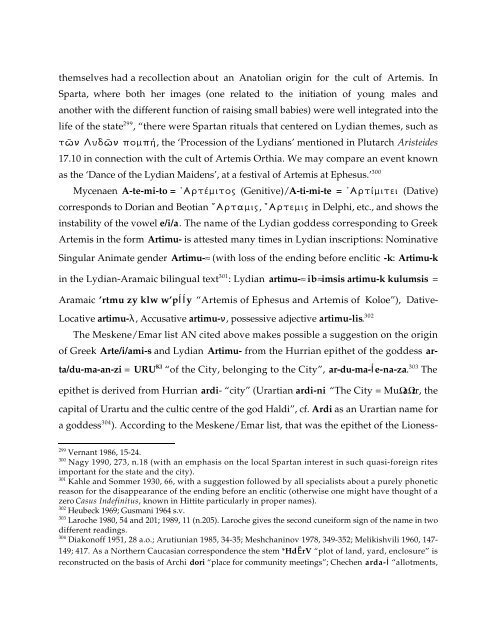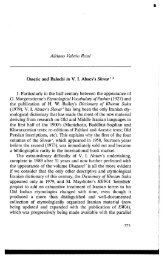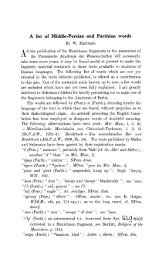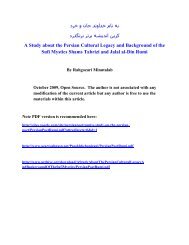Comparative Notes on Hurro-Urartian, Northern Caucasian
Comparative Notes on Hurro-Urartian, Northern Caucasian
Comparative Notes on Hurro-Urartian, Northern Caucasian
Create successful ePaper yourself
Turn your PDF publications into a flip-book with our unique Google optimized e-Paper software.
themselves had a recollecti<strong>on</strong> about an Anatolian origin for the cult of Artemis. In<br />
Sparta, where both her images (<strong>on</strong>e related to the initiati<strong>on</strong> of young males and<br />
another with the different functi<strong>on</strong> of raising small babies) were well integrated into the<br />
life of the state 299 , “there were Spartan rituals that centered <strong>on</strong> Lydian themes, such as<br />
t«n Lud«n pompÆ, the ‘Processi<strong>on</strong> of the Lydians’ menti<strong>on</strong>ed in Plutarch Aristeides<br />
17.10 in c<strong>on</strong>necti<strong>on</strong> with the cult of Artemis Orthia. We may compare an event known<br />
as the ‘Dance of the Lydian Maidens’, at a festival of Artemis at Ephesus.’ 300<br />
Mycenaen A-te-mi-to = ÉArt°mitow (Genitive)/A-ti-mi-te = ÉArt¤mitei (Dative)<br />
corresp<strong>on</strong>ds to Dorian and Beotian ÖArtamiw, ÖArtemiw in Delphi, etc., and shows the<br />
instability of the vowel e/i/a. The name of the Lydian goddess corresp<strong>on</strong>ding to Greek<br />
Artemis in the form Artimu- is attested many times in Lydian inscripti<strong>on</strong>s: Nominative<br />
Singular Animate gender Artimu-≈ (with loss of the ending before enclitic -k: Artimu-k<br />
in the Lydian-Aramaic bilingual text 301 : Lydian artimu-≈ ib≈imsis artimu-k kulumsis =<br />
Aramaic ’rtmu zy klw w’pÍÍy “Artemis of Ephesus and Artemis of Koloe”), Dative-<br />
Locative artimu-l, Accusative artimu-n, possessive adjective artimu-lis. 302<br />
The Meskene/Emar list AN cited above makes possible a suggesti<strong>on</strong> <strong>on</strong> the origin<br />
of Greek Arte/i/ami-s and Lydian Artimu- from the Hurrian epithet of the goddess ar-<br />
ta/du-ma-an-zi = URU KI “of the City, bel<strong>on</strong>ging to the City”, ar-du-ma-Íe-na-za. 303 The<br />
epithet is derived from Hurrian ardi- “city” (<strong>Urartian</strong> ardi-ni “The City = MuΩaΩir, the<br />
capital of Urartu and the cultic centre of the god Haldi”, cf. Ardi as an <strong>Urartian</strong> name for<br />
a goddess 304 ). According to the Meskene/Emar list, that was the epithet of the Li<strong>on</strong>ess-<br />
299 Vernant 1986, 15-24.<br />
300 Nagy 1990, 273, n.18 (with an emphasis <strong>on</strong> the local Spartan interest in such quasi-foreign rites<br />
important for the state and the city).<br />
301 Kahle and Sommer 1930, 66, with a suggesti<strong>on</strong> followed by all specialists about a purely ph<strong>on</strong>etic<br />
reas<strong>on</strong> for the disappearance of the ending before an enclitic (otherwise <strong>on</strong>e might have thought of a<br />
zero Casus Indefinitus, known in Hittite particularly in proper names).<br />
302 Heubeck 1969; Gusmani 1964 s.v.<br />
303 Laroche 1980, 54 and 201; 1989, 11 (n.205). Laroche gives the sec<strong>on</strong>d cuneiform sign of the name in two<br />
different readings.<br />
304 Diak<strong>on</strong>off 1951, 28 a.o.; Arutiunian 1985, 34-35; Meshchaninov 1978, 349-352; Melikishvili 1960, 147-<br />
149; 417. As a <strong>Northern</strong> <strong>Caucasian</strong> corresp<strong>on</strong>dence the stem *HdËrV “plot of land, yard, enclosure” is<br />
rec<strong>on</strong>structed <strong>on</strong> the basis of Archi dori “place for community meetings”; Chechen arda-Í “allotments,





